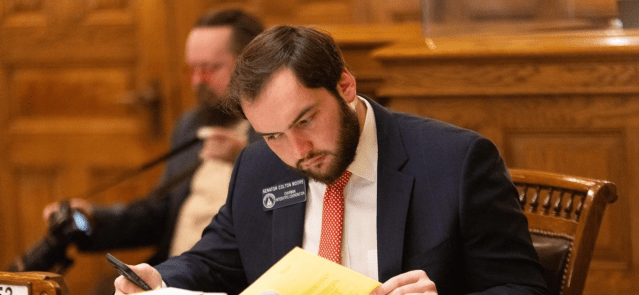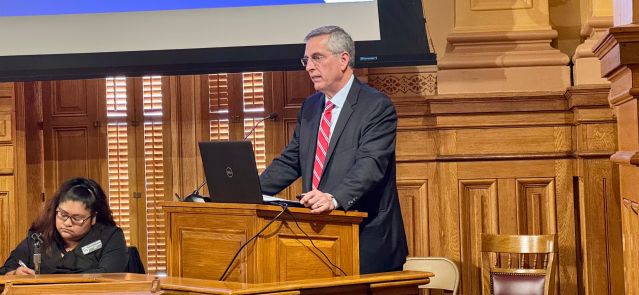Stay ahead of the curve as a political insider with deep policy analysis, daily briefings and policy-shaping tools.
Request a DemoWhat’s next for mental health in Georgia after key bill’s passage?
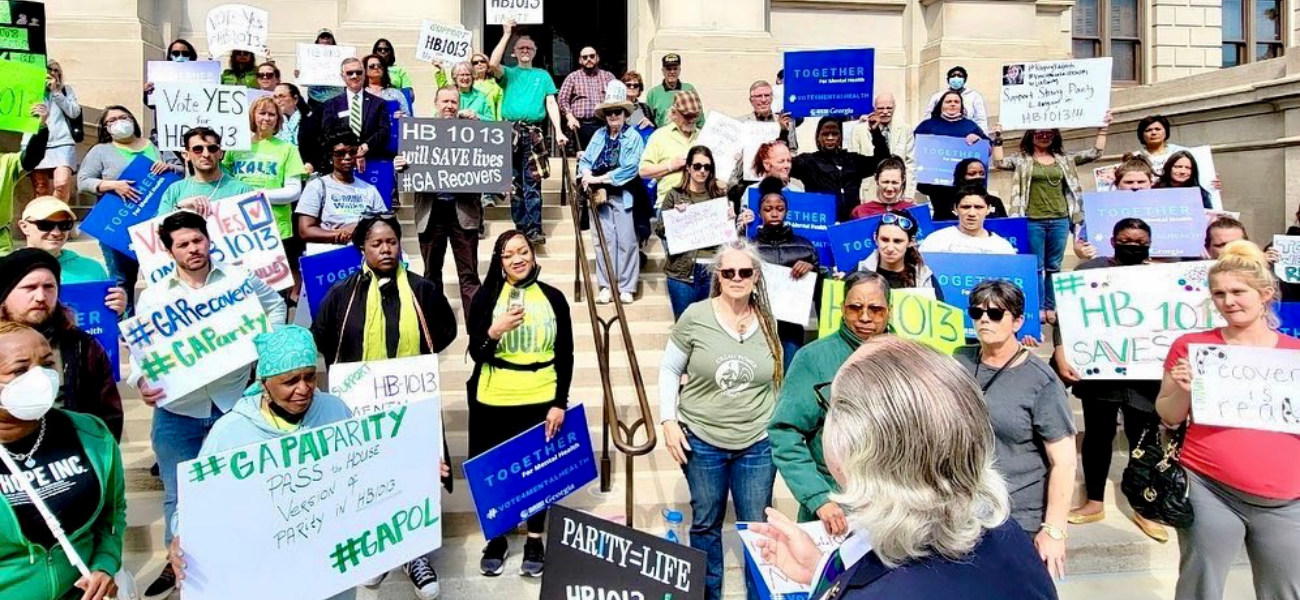
Credit: Jeff Breedlove
- 1 in 6 Georgians have mental-health needs while the state ranks 48th in access to care.
- Newly passed mental-health legislation seeks expanding care access and keeping more people in crisis out of jail and emergency rooms.
- Questions remain on how much state funding key mental-health programs will receive.
The Gist
State lawmakers moved not only to expand mental-health care coverage for hundreds of thousands of Georgians who struggle with accessing it, but also to keep people with severe conditions from winding up in jail or the emergency room instead of local treatment centers.
What’s Happening
The Mental Health Parity Act, sponsored by Georgia House Speaker David Ralston, R-Blue Ridge, proposes requiring Georgia’s insurance providers to guarantee coverage for mental health needs – a move patients and advocates say would help lift Georgia from the bottom ranks of states offering mental-health care access.
“It’s not just affecting one individual,” said Corinne Cherry, a Fulton County resident struggling with mental health and substance abuse issues. “It’s affecting everyone as human beings.”
“Now is the time for us to have parity and for us to have these services. I see people in my community that need this, now more than ever,” added Hank Arnold, a Coweta County resident recovering from substance abuse.
Ralston’s bill and related legislation also aim to bolster programs focused on keeping people with mental health issues out of jails and hospitals, such as “co-response” teams that send trained clinicians out with police officers to assess what to do with people experiencing psychotic episodes.
The bill passed both chambers of the General Assembly Wednesday and now heads to Gov. Brian Kemp’s desk for his signature.

LaGrange Police Chief Louis Dekmar stressed the need for more non-law enforcement help to address mental-health calls. He noted one person with a mental condition in LaGrange who’s been the subject of 176 calls and arrested 31 times over the past decade – a situation Dekmar says is costly and ineffective.
“The largest mental-health facility in each county is the county jail,” Dekmar told State Affairs. “We should not be in the mental-health business.”
Why It Matters
Georgia ranks 48th among all states in residents’ ability to access timely and effective mental health services and have insurance coverage for treatment, according to the nonprofit group Mental Health America (MHA).
The Peach State also ranks 50th in the number of adults with mental health needs who do not receive treatment, as well as 47th in the number of children with depression who don’t receive care, MHA’s findings show.
More than 1 in 6 adults had a mental health condition in Georgia in 2021, including around 336,000 who face serious mental illnesses such as bipolar disorder, severe anxiety or schizophrenia, according to State Affairs’ analysis of data from National Alliance on Mental Illness’ (NAMI) Georgia chapter.

Additionally, more than 44% of Georgia adults reported symptoms of anxiety or depression in February 2021, up about 10% from when the COVID-19 pandemic started in March 2020, according to data from the nonprofit Kaiser Family Foundation (KFF). And 104,000 of the state’s children aged 12 to 17 also suffered from depression in early 2021, according to NAMI data.
As of December 2021, roughly one-third of Georgia adults who need professional mental-health care reported not receiving it, largely due to high costs, NAMI and KFF report.
Nearly half of Georgia’s 159 counties don’t have a full-time psychiatrist, and in counties where there is a psychiatrist, only 53% accept Medicaid, making it tough for many low-income residents to secure mental-health treatment, according to recent findings from the state Behavioral Health Reform and Innovation Commission.
Advocates agree the lack of care access for people with mental health issues drives up costs far beyond what it takes to treat their conditions through larger jail populations, burdening hospitals and lost productivity at work.
“We have a system that people agree is dangerously broken,” said Jeff Breedlove, spokesman for the nonprofit Georgia Council on Substance Abuse.
The Money Question
Last December, state officials tallied up around $51 million likely needed to bolster several mental-health programs in the bill, including more than $28 million to spread co-response teams across the state, which send out mental-health workers on calls with police, according to a report from the state Office of Health Strategy and Coordination.
State lawmakers have offered up around half that amount so far, proposing between $22 million and $26 million amid negotiations that kicked off this week between top House and Senate lawmakers over next year’s $30 billion budget.

Lawmakers are also poised to budget between $3.2 million and $2.2 million for court-ordered involuntary treatment programs – less than the roughly $9.2 million to $11.4 million state fiscal analysts estimated would be needed to start bolstering those programs.
Some $18 million of the amount proposed by lawmakers in this latest bill are for “value-based payments” to local mental-health groups, with few details as to how that funding would be distributed. Both chambers’ lawmakers have proposed less than $1 million for co-response teams.
With less than a week left in this year’s legislative session, budget-writing lawmakers have only settled on approving $10 million to fund cancellable student loans for primary-care physicians and behavioral-health specialists who stay in Georgia and practice in underserved areas.
What’s Next?
Whatever happens this week, lawmakers expect to continue pumping more money into mental health in the years to come based on the blueprint from Ralston’s bill, said the speaker’s communications director, Kaleb McMichen.
“As for future funding, Speaker Ralston and the House have committed to addressing mental health care access and quality over the course of several years,” McMichen said. “We expect this issue will be part of the policy and budget discussions in 2023 and on into the future.”
It’s a sigh of relief for Breedlove, of the substance-abuse council, said other local advocates.
“We are operating with trust and confidence that they have been crunching the numbers for this,” Breedlove told State Affairs. “And we believe they have,” he said, adding that mental health advocates are confident funding will happen this year or next.

Kevin Tanner, the county manager for Forsyth County who heads the mental-health reform commission, also said he expects money to keep rolling in for mental health down the road.
“I’m very confident that we’re going to see the funding continue and that we’re going to see good decisions made,” said Tanner, a former state lawmaker.
That confidence is shared by Melanie Dallas, chief executive officer of the Highland Rivers Behavioral Health community service board. Her group, which covers counties in North Georgia from Fannin down to Cobb, said its co-responder teams and case workers have managed to keep 97% of people out of jail and 60% from ER visits since 2019.
“There is so much that we need to do,” Dallas said. “I am not going to shrug my shoulders at any amount of money.”
Join the Conversation
What do you want to know about mental health and state government in Georgia? Share your thoughts/tips by emailing: [email protected].
Want to contact your local state legislator about this issue? Find your legislator here.
Follow key players for this story:
Georgia Crisis and Access Line: 1-800-715-4225
National Suicide Prevention Line: 1-800-273-TALK (8255)
Georgia Department of Behavioral Health and Developmental Disabilities: @GeorgiaDBHDD on Facebook, @DBHDD on Twitter
National Alliance on Mental Illness (Georgia chapter): @NAMIGeorgia on Facebook, @namigeorgia on Twitter
Georgia Council on Substance Abuse: @GeorgiaRecovers on Facebook, @Recovery_GCSA on Twitter
Georgia Association of Community Service Boards: @GACSB on Facebook, @GACSB on Twitter
Highland Rivers Behavioral Health: @HighlandRiversHealth on Facebook, @HighlandRivers on Twitter
Mental Health America (Georgia chapter): @mhaofgeorgia on Facebook, @MHAofGeorgia on Twitter
Behavioral Health Link: @BehavioralHealthLink on Facebook, @BehavioralLink on Twitter
Kaiser Family Foundation: @KaiserFamilyFoundation on Facebook, @KFF on Twitter
Substance Abuse and Mental Health Services Administration: @SAMHSA on Facebook, @samhsagov on Twitter
Read this story for free.
Create AccountRead this story for free
By submitting your information, you agree to the Terms of Service and acknowledge our Privacy Policy.
Education activist Beth Majeroni challenges state Sen. Ben Watson in GOP primary
The Gist In a rare primary challenge, incumbent Republican Sen. Ben Watson faces conservative education activist Beth Majeroni in the state Senate District 1 race in the Savannah area. Watson has run unopposed or handily defeated Democratic challengers in seven previous general elections and hasn’t faced a Republican challenger since 2010, when he won 65% …
Senate District 53 incumbent Colton Moore draws criticism, challengers in his re-election bid
Senate District 53 is in the far northwest corner of Georgia, home of Lookout Mountain, Civil War reenactments and conservative firebrand U.S. Rep. Marjorie Taylor Greene. It’s a mostly white and Republican working-class pocket of the state where some people identify more Tennessean than Georgian.
Like Taylor Greene, state Sen. Colton Moore gained national attention and made a name for himself in the district through the same type of incendiary politics.
Moore’s antics have drawn Republican challenger Angela Pence for the May 21 primary election. Democrat Bart Bryant will be on the primary ballot next week and will face the Republican primary winner in November’s general election.
Pence, in March, told State Affairs: “While Moore grandstands for retweets and shares, real crises in his district, like toxic water contamination in our schools and skyrocketing property taxes — due to an outdated education funding formula — have gone unaddressed.”
Moore’s predecessor, Jeff Mullis, is supporting Pence.
“He doesn’t represent his district very well,” Jeff Mullis, who represented Senate District 53 for 22 years before retiring in 2022, told State Affairs. “He has been in the House for two years and now in the Senate, and he has never passed a bill of any kind that is his. He can’t influence a bill. He can’t even pass gas.”
The Senate Republican Caucus kicked Moore out last September after he launched verbal attacks against fellow Republicans for refusing to go along with him in his call for a special session to take action against Fulton County District Attorney Fani Willis.
Willis is prosecuting former President Donald Trump for election interference. Moore predicted a civil war if Trump doesn’t win in November.
Then, in March, the state House of Representatives banned Moore from the chamber after a tirade against the late Speaker of the House David Ralston.
Moore and Ralston crossed swords numerous times during Moore’s time in the House, where in 2018 he became the youngest elected official in Georgia history at 24, representing District 1. He was elected to the Senate in 2022.
Moore repeatedly voted against dozens of key bills in this year’s session, including ones involving child trafficking and law enforcement. He was the only senator to vote no on the state’s fiscal year 2025 budget, which included tax cuts.
“He’s refused to help his local communities, cities and counties when they’ve had a request,” Mullis said. “He’s stopped grants for the area because of his actions.”
State Affairs repeatedly tried unsuccessfully to reach Moore for a response and to learn of his legislative priorities if he were to win a second term in the Senate. He said in March that criminal justice reform was a priority.
Moore has said previously that he and his staff spend hours, sometimes days, reviewing legislation coming up for votes. He said he follows “a strict standard of principles.”
“When it comes to a piece of legislation, and in my opinion, any piece of legislation that misuses taxpayer money, it’s not the proper role of government. I typically vote against that,” Moore told State Affairs in March. “Bills that subdue individuals’ freedoms that shouldn’t be subdued, legislation that I think grants government power that it shouldn’t have, anything like that.”
Moore’s politics have been heavily influenced by the Georgia Freedom Caucus, for which he is the vice chair. It favors social conservatism and small government and opposes immigration reform.
Moore’s challengers say his behavior is keeping things from getting done in their district, which includes Chattooga, Dade, Walker and Catoosa counties. The district also includes northwest Floyd County and the unincorporated Floyd County community of Armuchee.
Democratic challenger Bart Bryant said Moore’s Ralston rant prompted him to run against the incumbent. Bryant planned to run against Taylor Greene but ceded the race to fellow Democrat Shawn Harris, a retired Army brigadier general.
“Mr. Colton Moore has zero respect,” said Bryant, an electrician living in Menlo. “That doesn’t represent me. We need to respect one another. I’m running on respect to start with.”
Bryant said issues in the district are going unaddressed, such as mental health and overcrowded jails. As a former sheriff’s deputy, he’d work to get better pay for law enforcement personnel.
Pence also did not respond to State Affairs for comment but in the March interview zeroed in on Moore’s performative representation.
“The people don’t need any more unhinged sideshows — they need someone who will roll up their sleeves, put in the real work and score concrete wins that positively impact their daily lives,” she said.
Pence is a former Libertarian who tried unsuccessfully to get on the Georgia ballot to run against Taylor Greene in 2022. The small-business owner believes in limited government as well as economic and individual freedom. She is a lifelong North Georgia mountain resident who homeschools her children.

Incumbent Colton Moore
Age: 30
Residence: Trenton
Occupation: auctioneer and truck driver
Party affiliation: Republican
Key platform issues: Criminal justice reform
Previous public service experience: Georgia House of Representatives from 2019 – 2021; Georgia Senate, January 2023-present.
Campaign cash on hand: $24,410.33**
Family: Information not available
**Data as of May 8. Information is from the Georgia Campaign Finance Commission

challenger angela pence
Age: Early 30s
Residence: Chickamauga
Occupation: Small-business owner
Party affiliation: Republican
Why I’m running: “I’m running to be the voice for ordinary citizens who want real results,” she told The Mountain-Valley Independent.
Key platform issues: She is anti-abortion.. She is against government funding of gender-affirming care for minors. She is an advocate for “true school choice” and will work to “remove government tape and ridiculous requirements so that we can get the power back into the hands of the educators.”
What is your advantage over the other candidates?: She plans to bring principled, effective leadership to a district that has gone unheard.
Previous public or community service experience: She has coached youth sports and is active in the local chamber of commerce as well as various civic and grassroots initiatives.
Campaign cash on hand: $1,701.65***
Family: Military wife and mother who homeschools her nine children.
***Data as of May 7. Information is from the Georgia Campaign Finance Commission

Challenger Bart Alexander Bryant
Age: 58
Residence: Menlo
Occupation: Electrician
Party affiliation: Democrat
Why I’m running: He says the incumbent’s behavior in the Legislature is disrespectful.
Key platform issues: Mental health issues: They’re “a problem statewide.” Second Amendment: “If you haven’t committed crimes and you want to own a firearm, you can own it.” Abortion rights: “I hate abortion but there’s a place for it in our society.” Better pay for law enforcement.
What is your advantage over the other candidates?: “I’ve worked a real job all my life. I kind of have my finger on the pulse of what the public talks about. [Being a senator is] not a real hard job. All you have to do is listen and vote appropriately. I’ll be able to communicate across the [political] aisle.”
Previous public or community service experience: He has been a longtime member of the International Brotherhood of Electrical Workers, where he served as a shop steward, a liaison between union leaders and members. He is a former Chattooga County deputy sheriff. “Being a peace officer, you have to make some hard decisions.”
Campaign cash on hand: Bryant said he is financing his campaign with about $500 of his own money.
Family: Married to wife April for 36 years.
Have questions? Contact Tammy Joyner on X @lvjoyner or at [email protected].
House leadership sets up committee to look into licensing delays, prompting pushback from Raffensperger
State lawmakers have launched an investigation into why businesses and individuals are having a hard time getting professional licenses in a timely manner.
On Monday, the leaders of both legislative chambers established a joint blue-ribbon committee to look into licensing problems within the Secretary of State’s Professional Licensing Boards Division, prompting push back from Secretary of State Brad Raffensperger, who noted that the state is redirecting millions of dollars intended for the division to its general fund.
“One of the most important duties of the Office of the Secretary of State is to ensure licenses and certifications are obtainable in a timely and efficient manner. It has become increasingly clear that the secretary of state is incapable of handling such duties,” Lt. Gov. Burt Jones, who also is president of the Senate, said in a statement announcing the investigation.
In a letter to Raffensperger, Jones and House Speaker Jon Burns said they’ve received numerous complaints from businesses about the difficulty in getting and renewing required licenses and certificates, which companies say has led to delays and disruptions.
Jones and Burns added that their constituents are hindered by the online license application process.
The panel, they said, will “examine ways in which we can improve our licensing processes. We must ensure that the government is not impeding Georgians from starting or expanding their businesses.”
Raffensperger responded Tuesday that the professional licensing division generally brings in between $25 million and $30 million a year in fees from businesses and individuals seeking licenses but the state redirects a majority of those fees to its general fund.
“The reality is that small business owners are expecting the level of service that they are paying for, yet the majority of their fees are being redirected to the general fund,” Raffensperger said in a letter to Jones and Burns.
The state’s method of issuing licenses is outdated, Raffensperger added, noting he was disappointed that a couple of bills that would have addressed that problem failed to make it through the Legislature this year.
Raffensperger also said in his letter that the nearly $1.5 million allocated to the division in the fiscal year 2025 budget “ will go a long way towards getting this historically underfunded division to serviceable levels.”
Meanwhile, the secretary of state’s office led an effort last year to improve barriers to licensing through the GA Works Licensing Commission, which included legislators and business leaders who after four meetings made recommendations that included putting more processes online and better funding the understaffed Professional Licensing Boards Division.
As previously reported by State Affairs, many occupational licenses in Georgia are issued by one of 43 licensing boards within the Professional Licensing Boards Division.
They cover 197 license types, including for cosmetologists, nurses, social workers, foresters, architects and plumbers. Other professions are regulated by independent state boards, like doctors, engineers and realtors.
About 27% of professional license applications administered by the Professional Licensing Board Division take a year or more to process, according to Raffensperger. The rest can take up to six months. Some boards are relying on paper applications, mail service and manual processes to handle applications.
Have questions or comments? Contact Issac Morgan on X @issacmorgan12 or at [email protected] and Tammy Joyner on X @lvjoyner or at [email protected].
Weekend Read: Mesha Mainor expected to face uphill battle to retain seat — even against little-known competitors
Three of the four candidates for Georgia House District 56 in southwest Atlanta are scheduled to appear at a forum in Fulton County next week, just a few days ahead of the May 21 primary election.
Rep. Mesha Mainor won’t be among them. The incumbent, an Atlanta native running for her third term, said she won’t go because her alleged former stalker — one of her Democratic challengers — will be there.
But in any group of Democrats gathered in Atlanta lately, Mainor is the odd woman out. Since switching to the Republican Party last July, she has earned the enmity of many of her former Democratic colleagues, as well as the voters who elected her.
Mainor’s strong support for bills creating private school vouchers and disciplining prosecutors last year made her a pariah among some in her party. After Mainor cast the lone Democratic vote for Senate Bill 233, the Georgia Promise Scholarship Act, which narrowly failed, Sen. Josh McLaurin, D-Sandy Springs, said that “a Democrat who votes to defund public education should be primaried,” and posted online a photo of a $1,000 check awaiting Mainor’s primary challenger.
More condemnation and criticism from other Democrats followed, leading Mainor to announce last July that she was leaving the Democratic Party due to their “harassment” and intolerance. In doing so, she became the only Black member of the GOP among Georgia’s 236 lawmakers and the first Black Republican woman to ever serve in the Georgia General Assembly.
This year Mainor voted as a member of the Republican majority to pass the school voucher bill, as well as Senate Bill 332, which empowers the oversight commission aimed at disciplining “rogue” and errant prosecutors.
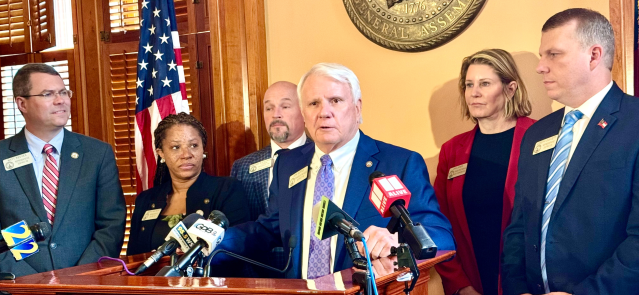
‘Dead woman walking’
Mainor’s Republican colleagues have praised her for taking a stand on the two bills, despite the political cost.
“She was a leader on that education reform bill from start to finish,” said Rep. Matt Reeves, R-Duluth, adding that “here in Georgia, I think that people want to see problem solving and effectiveness and delivering results. And that’s what she has done.”
House Speaker Jon Burns, R-Newington, told State Affairs that “[Mainor’s] support of school choice legislation played a vital role” in the bill’s passing. He added, “Representative Mainor’s dedication to common-sense policies that support Georgia’s children, families and communities has been evident since day one.”
Still, Mainor, who has no Republican primary opposition, faces long odds for reelection in November in her strongly Democratic district, where 90% of voters chose Joe Biden for president in 2020.
House District 56 is 47% Black, 32% White, 10% Asian and 6% Hispanic or Latino, and 26% of residents live below the poverty line, according to 2022 data from the Atlanta Regional Commission.
“She has incumbency in her favor, and she’ll do better than most Republicans in a heavily Democratic district where African Americans are a key constituency, but she will get nowhere close to 50% plus one vote,” said Charles Bullock, a political science professor at the University of Georgia.
“She alienated everyone in the Democratic caucus and engendered animosity among her colleagues” through her unpopular votes, he said. And once Mainor switched parties, “she was a dead woman walking from that point on,” Bullock said. “I would imagine most Republican strategists have written that district off.”
“Party matters,” said Andra Gillespie, a political science associate professor at Emory University. Although “there is a diversity of thought within Black communities on issues related to school choice, this is likely not the top issue for voters in her district in this cycle,” Gillespie said. “And Democratic voters as a whole tend to penalize more conservative candidates. Party switching kind of goes beyond the pale. … While she may have some residual level of support as an incumbent, most people are not going to defect and go vote for her because they’ve known her before. Partisanship is going to hold that back.”
Mainor’s Democratic challengers


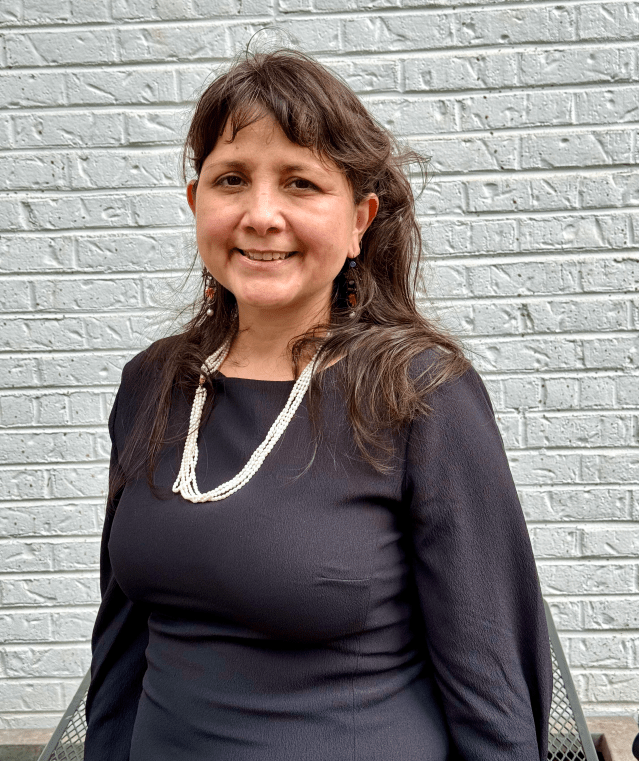
Mainor’s first Democratic challenger to emerge was Bryce Berry, a 22-year-old seventh-grade math teacher and president of the Young Democrats of Georgia.
Originally from St. Louis, Berry said he got involved in community organizing as a teen after the shooting death of Michael Brown by police in nearby Ferguson in 2014. At Morehouse College, Berry started a state-level student group to help elect Joe Biden and Kamala Harris in 2020 and then led college voter mobilization efforts for the Georgia Democratic Party in 2022.
Berry has since won the endorsement of dozens of Democratic state legislators, including most of the House leadership. He also has the backing of several Atlanta school board members, Fulton County commissioners and Democratic student organizations at Spelman and Morehouse colleges.
Berry, a teacher at Young Middle School, in southwest Atlanta has raised $36,350 in campaign contributions since last July, and his campaign war chest held $19,150 as of April 30. Mainor, meanwhile, reported raising $62,863 over the last three quarters and had $12,420 in her campaign account through April.
Berry’s platform includes measures around education reform, expanding Medicaid coverage, raising the minimum wage and working with local and federal governments to create more affordable, mixed-use housing developments in Georgia.
“Fundamentally, Rep. Mainor has left our community behind,” Berry said. “It’s not just about her switching parties; it’s about her actions. …Voters in my district feel like they are not being heard by the state, their needs are not being met and they’re ready for a return back to a visionary, progressive Democrat who will work tirelessly to improve their lives.”
Emory’s Gillespie said Berry appears to be the front-runner in the District 56 Democratic primary.
The Democratic candidate with the next-best level of name recognition in House District 56 is likely Corwin “CP” Monson.
Monson, 50, an audio engineer, was a volunteer in Mainor’s unsuccessful campaign for Atlanta City Council in 2019 before she fired him for being disruptive, she said. Soon after, she accused him of stalking her. A Fulton judge granted a temporary protective order against Monson, who was later arrested for violating it.
In September 2021, in a plea deal offered by Fulton County District Attorney Fani Willis, Monson pleaded no contest to aggravated stalking charges and accepted a three-year sentence — one in prison and the rest on probation. Having already served 10-and a-half months in jail, he was released in November 2021.
Monson has denied stalking Mainor, who he said has “lied and committed character assassination” against him. He told State Affairs he took the plea deal to get out of jail after his lawyer told him a court backlog in Fulton County meant his case might not be heard for another two years.
Monson, who has been endorsed by former state representative for District 56 “Able” Mable Thomas, is campaigning on economic development and education reform, including making the school funding formula “more equitable” for low-performing and rural schools.
Monson also seeks to expand Medicaid and other affordable health care options, as well as pursue criminal justice reform.
He reported $1,005 in campaign donations as of January, but has not yet filed a campaign finance report for the first quarter of 2024, which was due on May 7.
Last week, Mainor announced she is suing Fulton County, Willis and Fulton County Commissioner Marvin Arrington (who initially represented Monson) in civil court for their mishandling of the stalking case against Monson, which she said was not properly investigated, was sidetracked due to interference from Arrington and resulted in a too-lenient sentence.
Also challenging Mainor is Adalina “Ada” Merello, a 42-year-old waitress who has lived in Vine City in House District 56 for two years.
Originally from Eugene, Oregon, she has an extensive background in government and campaign-related work, including working for former Atlanta Mayor Kasim Reed on neighborhood improvement and service-based initiatives and volunteering for the campaigns of former President Barack Obama in 2012, gubernatorial candidate Stacey Abrams in 2018 and U.S. Rep. Nikema Williams and U.S. Sens. Jon Ossoff and Raphael Warnock in 2020 and 2021.
“I’m running because the neighborhood has been misrepresented for too long,” Merello told State Affairs. “Recently, we’ve had backstabbing with misrepresentation,” she said of Mainor’s party switch. “But I believe prior to that, we just don’t have a loud enough voice at the Gold Dome. So I’m newer in the neighborhood, but what I’ve seen is just people living their day-to-day lives, wanting life to be a little easier. And I don’t mean that in a handout way but a hand-up way, of people helping each other.”
Her campaign platform includes mental health reform, with a focus on further implementing some of the parity goals established in the major mental health legislation passed in 2022.
Merello, who has openly discussed her bipolar disorder diagnosis, said she “wants to normalize mental health issues and treatment to make life easier for people who’ve had lives like mine.”
She also wants to improve public schools, create more food security for low-income residents, enact more tenant protections and expand LGBTQ+ rights.
Merello reported $13,219 in campaign contributions as of April 30.
Running on her record
Shrugging off Democrats’ criticism , Mainor, 49, maintains she is “extremely proud” of her advocacy for “the school choice bill,” which she said will deliver sorely needed education options to families in her district, where only 2% or 3% of students at some schools meet reading and math proficiency levels, she said.
Mainor grew up in the Hunter Hills neighborhood of District 56, where she said property and violent crimes, prostitution and the drug trade were rampant and students like her were stuck attending low-performing, poorly equipped schools. She said her mother “worked the system” to enable her to attend Mays High School across town, a better public school that put her on a path to attend Howard University.
“Currently, my district has the most charter schools than any other district in the entire state,” she said. “And what does that mean? That means parents want options and choices. And I do believe school choice is going to create a competitive environment; it’s going to change the dynamics of the education system, which needs to happen. I mean, we really do need to look at how education is done. The school board essentially controls the curriculum, and it’s not serving all students well enough. … And so I think SB 233 will allow families to kind of pick what they want.”
Besides improving educational opportunities for children, Mainor said she’ll continue to focus on public safety and criminal justice reform. She pointed to a bill she sponsored last session, House Bill 1165, that will bring in $7.5 million in federal funds for gun violence prevention programs in Georgia, which Kemp signed in April. She also worked this year with Rep. Reeves on House Bill 926, also known as the Second Chance Workforce Act, which allows people to keep their driver’s licenses and “to still be able to get to work” while they’re awaiting court appearances. Kemp signed it last week.
In 2023, as a Democrat she authored House Bill 142, the Unified Campus Public Safety Act, which allows police on the multiple Atlanta University Center campuses in southwest Atlanta to cross boundaries and collaborate, which she said was in response to campus shootings and bomb scares.
Mainor pointed to other accomplishments during her two terms, including her bill in 2021 to create the Fulton Technology & Energy Authority, an agency that fosters the development of energy-saving technologies that she said will lower the energy burden and create good-paying, green jobs for her constituents.
If reelected, her “key priorities are going to be continuing in the education space,” she said. “But in addition to schoolwide things, I really want to focus on the criminal justice system. I want to see what kind of resources you have while you’re in jail that are getting you ready for when you go out of jail and then when you’re on probation, because we really need to be more comprehensive with the resources we’re giving ‘second chance’ citizens once they come out.”
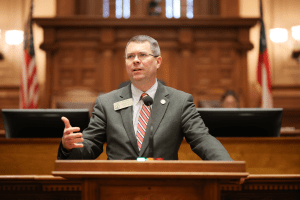
Reeves, who serves on two House judiciary committees, said Mainor “has a passion for workforce issues and upward mobility of young people. … I think her mindset is rather than having people unnecessarily go to jail or go to prison, to figure out a way to not have their work and education disrupted. And that invariably touches on legal and criminal and public safety issues, so we’ve had multiple chances to work together. And what I’ve seen is she’s very educated, intelligent, a deep thinker in terms of legislative matters. She gets the big picture and the philosophical issues, but she’s always working on the practical part of it to help out her constituents.”
Mainor said she has enjoyed accomplishing more as a legislator in the Republican majority.
“Mentally, I’m in a better place because I don’t have the hostility on one side, because of my vote on school choice or whatever vote I did. And so I feel like I’m in a space where I am encouraged,” she said. “And I got a lot more done this year than I did last year.”

She said she is relying on voters in her district to “look at my record and reflect on what I’ve been able to deliver and see how that compares to what you’ve gotten from Democratic representation in recent years. I tell people, ‘Now you have someone at the other side of the table, sharing what your needs are, because right now [the Republicans] don’t know. I’m able to go and say this type of community needs this. Right now they have no idea.’”
Mainor said, “People in the community have told me, ‘You have helped us and we don’t care what letter is next to your name,’ and sent texts saying, ‘I guess I’m gonna vote across the ballot.’ Many people are coming to me secretly. You know, being Black and a Republican is taboo. You’re not allowed to be a Republican if you’re Black. You’re bound to face bullying and ridicule. Nobody, no one feels like they can just come out and say it, and that’s fine. I just need them to vote for me at the ballot box.”
Gillespie of Emory said Mainor might be expecting too much from voters.
“As a third-term incumbent, you have an incumbency advantage, but you haven’t built up a long-term reservoir of goodwill yet, compared to someone who’s held on to the seat for, say, 20 years,” she said. “It’s a risky thing to get ahead of your constituents on policy, when your constituents aren’t animated by the same issues that you are. And now we’re going to see what the impact of that is.”
Early voting is underway through May 17, and primary election day is May 21. Primary runoff elections, if needed, will be held June 18. The general election will happen Nov. 5.
Read these related stories:
Have questions, comments or tips? Contact Jill Jordan Sieder on X @journalistajill or at [email protected].


